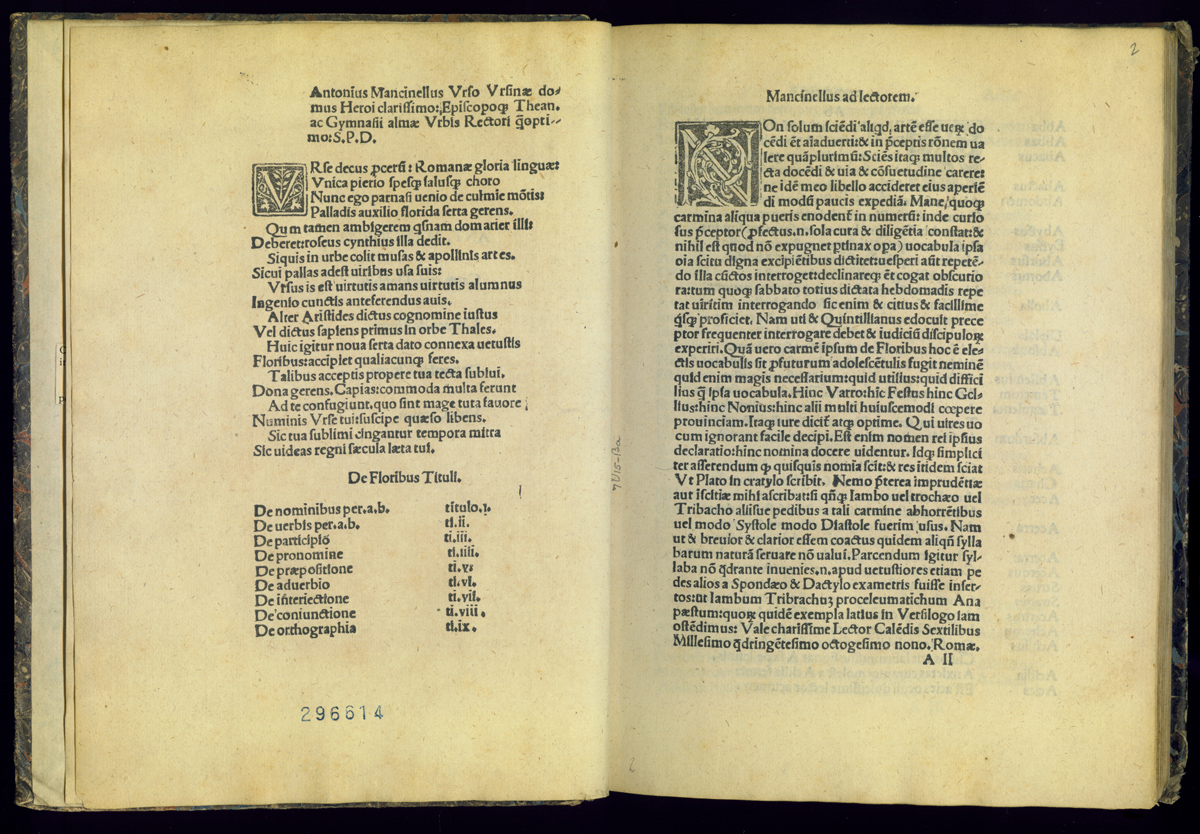3.07 Off to Rome

Mancinelli named four other works that he says he composed at Velletri. The verse autobiography lists them as Spica: figurae: Thesaurus: flores. The order is presumably determined by the meter, since the Verses on Figures of Speech (Carmen de figuris) and the Verses on Ornament (Carmen de floribus) were in fact companion pieces from their first publication. Like the Spica (this poetic title means "an ear of corn"), the two carmina are versifications of grammatical rules intended for memorization. They aimed to help the students to recall obscure and difficult points of grammar. The Spica recapitulated in verse much of the irregular noun and verb lore presented in prose in the Regulae and Summa declinationis; the Carmen de figuris rehearsed over one hundred figures of speech; and the Carmen de floribus was an elaborate versified vocabulary. The Dictionary of Verb Usage (Thesaurus de varia constructione) gives a classified list of usages drawn from classical sources worthy of imitation in alphabetical order. Each article gives the verb, its "constructions" (the cases or prepositional forms which complete the verb phrase), and an example from a good classical author, cited explicitly. Unlike the other works in this group, it is not in verse. (29)
Mancinelli said that these four works were written at Velletri, but they were printed only after his move to Rome in 1486. Their dedications reflect Mancinelli's suddenly enlarged and newly clerical acquaintance and the fact that at Rome his appointment was at the University level while he continued to teach younger students privately. Three of them were dedicated to prominent Roman churchmen and their kin. Only the Thesaurus claimed the patronage typical of earlier works, of a lay notable (a university professor) and his sons. (30)
It would seem, then, that though Mancinelli placed these works in his Velletri period, they were also, at least in part, contributions to a campaign to get hired in Rome or to get recognition there once hired. Up to 1486, after all, Mancinelli had a purely regional reputation and had published only a few things, mostly in Rome. Mancinelli's earliest works were slight, auxiliary texts for grammar teaching at a fairly elementary level. These new works aimed higher, as their dedications imply. The Spica was also prefaced by a bald advertisement: "Let barbarous Alexander begone, and retreat with his barbarities to his barbarous homeland. Let the truly Roman and elegant Mancinelli everywhere flourish, and everywhere be recited." (31) This is a striking claim, that the Spica would supplant the perennially popular Doctrinale of Alexander of Villa Dei, a work that had been used all over Europe for two centuries. Italian humanists had criticized the Doctrinale ineffectually for generations for its unclassical Latinity. Unlike the common Donat, it could not be "fixed" by good editing. (32) The pedagogy of the elementary and intermediate Latin course was tied to making students parrot verse rules; so none of the earlier humanist grammars, all in prose, offered an adequate substitute for the Doctrinale. A verse grammar attempted by Lorenzo Valla never even got printed. (33) A systematic treatment in verse of the basic noun and verb inflections was a desideratum, and the Spica was Mancinelli's offering. In the event it had modest success, but never really became a standard textbook.
Rome also affected the kind of new writing and publishing Mancinelli undertook. As we have seen, the first of his works printed there after his transfer were school texts which he had perhaps been composing in Velletri. But while in Rome, he began work on scholarly commentaries (on Virgil, Juvenal, Horace and Pseudo-Cicero) based on his university teaching. He also composed another school text, called Versilogus (Verse-Form Guide). Part of the logic of this change of emphasis is explained in a letter of spring 1500, where, amidst contract negotiations with the city fathers of Foligno he said that he might be able to take up their offer of a teaching position, but could not do so until the end of September because he wanted to be in Rome that month studying manuscripts of classical authors. (34) One of the attractions of Rome for any humanist was the riches of its libraries, just as one of the costs of accepting provincial appointments was the relative paucity of scholarly resources. Since the indications we have about the dates and places of composition of his early works come from the autobiographical poem that he wrote on his fortieth birthday, it may also be that Mancinelli wanted to present his Roman and Venetian years (1486-1493) as those of maturing scholarly accomplishment, and not just a continuation of his successful teaching career. (35)
NOTES
- Open Bibliography
- (29) On these works, Mellidi 2002, 113-121; Green 1999, 81-83; on humanist mnemonics, Jensen 1998, 265.
- (30) Mancinelli 1490c; on this circle, Renazzi 1803, 204-05; Chambers 1976, 77-81, 88-90; Mellidi 2002, 48-55, 73-78.
- (31) Mancinelli 1488b: Abeat iam barbarus Alexander et barbaram cum sua barbarie repetat patriam. Et vere romanus ac elegans Mancinellus ubique vigeat et decantetur.
- (32) Crane 2005, 76-87, however, describes several attempts by Josse Bade to do so.
- (33) Its modern editor does not hazard a guess as to why; Casciano 1983; Valla 1990.
- (34) Vatican, MS Ottoboniani lat. 2413, fol. 24; Campanelli 1997, 313.
- (35) On these commentaries, Mellidi 2002, 151-178; on the importance of library research, ibid., 69-70.